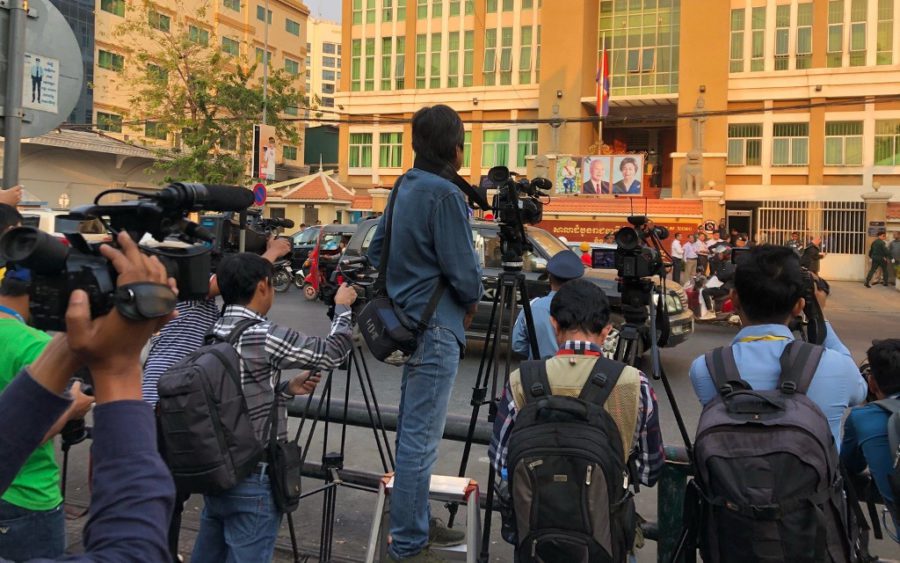Civil society groups on Thursday called on the Phnom Penh Municipal Court to give them and journalists access to the trial of the leader of the dissolved opposition, Kem Sokha, as the first day of hearings saw nearly no journalists or NGOs allowed to observe.
Eighty-two local communities and human rights and press freedom organizations also said in a statement the Sokha proceedings — which may last months — should be broadcast to the public, with his family members allowed to attend, to ensure an “open and transparent” trial.
Sokha, president of the outlawed opposition CNRP, faces up to 30 years in prison on charges of conspiracy with a foreign power for allegedly attempting to overthrow the government with U.S. support.
Sokha again denied the charges on Wednesday, as has the U.S.
During the first day of the trial, occurring more than two years after Sokha’s 2017 arrest, just two journalists were allowed into the courtroom to cover the morning proceedings firsthand. They were denied access to the afternoon hearing.
May Titthara, executive director of journalist association CamboJA, said in the statement that the court should allow journalists in the courtroom so they can report what happened, rather than waiting to receive information secondhand.
“If the room is limited, the court should broadcast the trial proceedings live — it’s the digital age,” Titthara said. “To restore a better space for media, the court should change their mindset.”
CamboJA’s board includes VOD staff. Cambodian Center for Independent Media (CCIM), VOD’s parent organization, also signed the joint statement.
The Justice Ministry has said there was no policy prohibiting reporters from observing the trial. However, the court lacked enough space to allow in everyone who registered to attend and didn’t have the equipment to broadcast the hearings.
However, “Firsthand reports from the trial found that despite the court’s insistence that the court room could only seat 30 people, the room had capacity for more than 60 members of the public,” the civil society statement said.
In addition, on Wednesday, some seats were left empty in the courtroom, it said.
Justice Ministry spokesman Chin Malin told VOD on Thursday that journalists kept outside the court could interview lawyers for the government and the defense to understand the proceedings.
“It will be very clear and in detail about the procedure of the case. If you are attending yourself, you may not understand much about the court’s processes and procedures, as it is a lot of legal aspects,” Malin said.
Political analyst Meas Nee said, in terms of Sokha’s case, the government appeared to be trying to find some way to use the law to solve a political problem.
“I think in this situation the government would not dare to open up more to the public. When more come to watch, they are able to see the loopholes that lead to more public criticism,” Nee said.
Some foreign embassy officials, who have taken most of the seats made available in the courtroom, said on Thursday that the proceedings should be open and accessible.
Hugo Wavrin, a French Embassy spokesman, said embassy staff had attended the first day of hearings and would continue to attend the proceedings.
“We believe the hearing should be open to the public,” Wavrin said in an email.
The U.S. is “closely following” Sokha’s trial and has urged the court to allow in media and civil society members, as well as adhere to standards of impartiality, transparency and fair trials, embassy spokesman Arend Zwartjes said in an email.
The Japanese Embassy’s Suzuki Hironori said embassy staff attended the hearings on Wednesday and Thursday to “gather information as part of our work,” but declined to comment further.
(Translated and edited from the original article on VOD Khmer)












